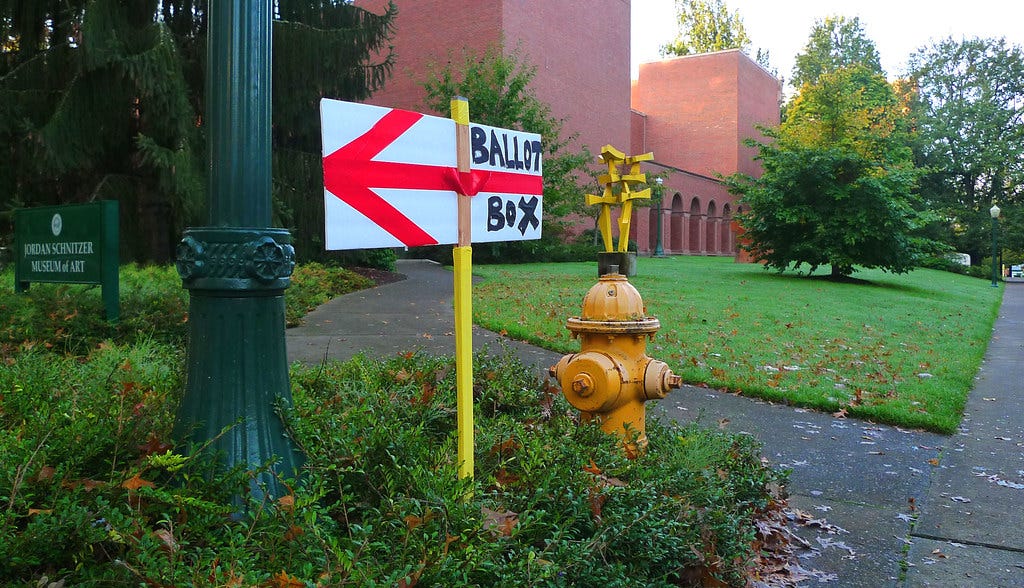Announcing Proportional Representation Oregon (PRO)
PRO invites readers to join us in the effort to reform our electoral process.
One year ago, I was having a conversation with Rob Richie, a national election and voting expert and President of FairVote (www.fairvote.org). Rob has been at the forefront of election reform on the national stage for years, primarily as an advocate of ranked choice voting.
We both felt frustrated at the lack of progress in improving our election process and I asked Rob, “What is the biggest barrier to election reform?”
He answered without hesitation, “Disagreement among election reformers about ‘the best’ reform. Opponents of election reform use these disagreements to undermine all reform proposals as not ready for prime time, or ones even reformers can’t agree on.”
That conversation led to the formation of a discussion group of Oregon election reform advocates who, like many readers of and contributors to The Oregon Way, believe we need to update our systems of electing and governing in order to restore confidence in our democracy. Our discussion group brainstormed on how to develop a process to identify and support the most effective and currently viable reforms and unite the reform community to work together to enact those reforms.
The first test for this challenging assignment was to develop a decision-making process for our group. We are a heterogenous group. Some of our group favored nonpartisan redistricting, others thought campaign finance reform, ranked choice, STAR voting or multi-member districts were top priorities. Our discussions helped us build trust that the end purpose of all the group member’s was the same. We agreed that for us to succeed, individual members of the group would need to initially set aside their favored reforms and focus efforts on identifying the most impactful and viable reforms.
After several weeks we decided that our project had potential. We named our group Proportional Representation Oregon (PRO). In March of 2021 PRO started meeting regularly to talk through realistic goals and the potential paths to achieve those goals. Some first questions were: How could we assist in “calling the question?” and how do we build trust and confidence among reformers?
PRO’s initial solution to these questions was to convene a citizen’s assembly where reform groups would present their best ideas. The assembly would make recommendations that reformers would agree, prior to participating, to adopt and work to implement. We felt that though this proposal had much merit the cost of convening and running a citizen’s assembly is currently out of reach. While we still strongly favor holding a citizens assembly as part of our project, its implementation is pending financial backing.
We ultimately settled on a three phase, one step at a time, plan with fewer logistical and financial barriers:
Identify election reforms that are realistic and popularly viable.
Convene stakeholders and evaluate these best opportunities.
Unite, build coalitions and take action through the ballot measure process.
What PRO is attempting is not unique in Oregon. We’ve been informed to some extent by the Portland Charter Review Commission, which is an independent body convened every 10 years to review and recommend amendments to the City Charter. The Commission is currently active and expected to recommend substantial changes so that Portland’s City Council will be more proportionally representative of the people of Portland.
We honestly don’t know if the PRO framework will gain traction, but we do believe that substantial election reform can only be achieved if reformers build substantial unity of purpose. Once we accomplish this goal, electoral reform proposals will have a better chance to persuade a skeptical public and answer the arguments of opponents.
PRO is currently in phase one. Identifying reform groups or organizations and getting more information on their proposals and resources. We’re using currently publicly available polling data to gauge public opinion on different reforms.
What can you do? PRO invites readers to join us in the effort to reform our electoral process. The Oregon Way community could play an important role by following our progress and jumping in with support, volunteer time, or provide information or ideas. In our social media driven world, simply giving us a follow on twitter @pro-Oregon would be appreciated. If you’d like to learn more information, meet the PRO team or get on an email list for any announcements, go to www.PROregon.org.
Rob Harris is a Team Member of Proportional Representation Oregon.
Photo credit: "Ballot Box Directions - University of Oregon" by Wolfram Burner is licensed under CC BY-NC 2.0





I agree that multi-member districts filled via proportional representation is the best approach for city government. It reduces - or eliminates - the gerrymander incentive. It results in a significant group of residents gaining representation. I also think that city elections should be nonpartisan. I disagree that more than half of city council members should be elected during the high turnout presidential election years. Staggering the terms of council members facilitates continuity of long range plans. I have not determined my preferred method of proportional representation. The ability to audit election results should be a factor for selecting a preferred method.
My take on Richie is that he is a deeply dishonest political animal.
https://www.rangevoting.org/RichieOnApproval
That said, multi-winner PR voting methods are a legitimately thorny issue. The Portland Charter Review Commission's voting methods subcommittee just endorsed STAR voting over IRV/RCV 3-1, so given that may be the direction things head in the state's largest city, here's a solid proposal for a PR form of score/STAR voting.
https://clayshentrup.medium.com/sequential-reweighted-monroe-score-voting-a410d1d2727a
Another (very different) voting method based on asset voting is here.
https://medium.com/election-science/candidate-transferable-voting-4fa1ee608251